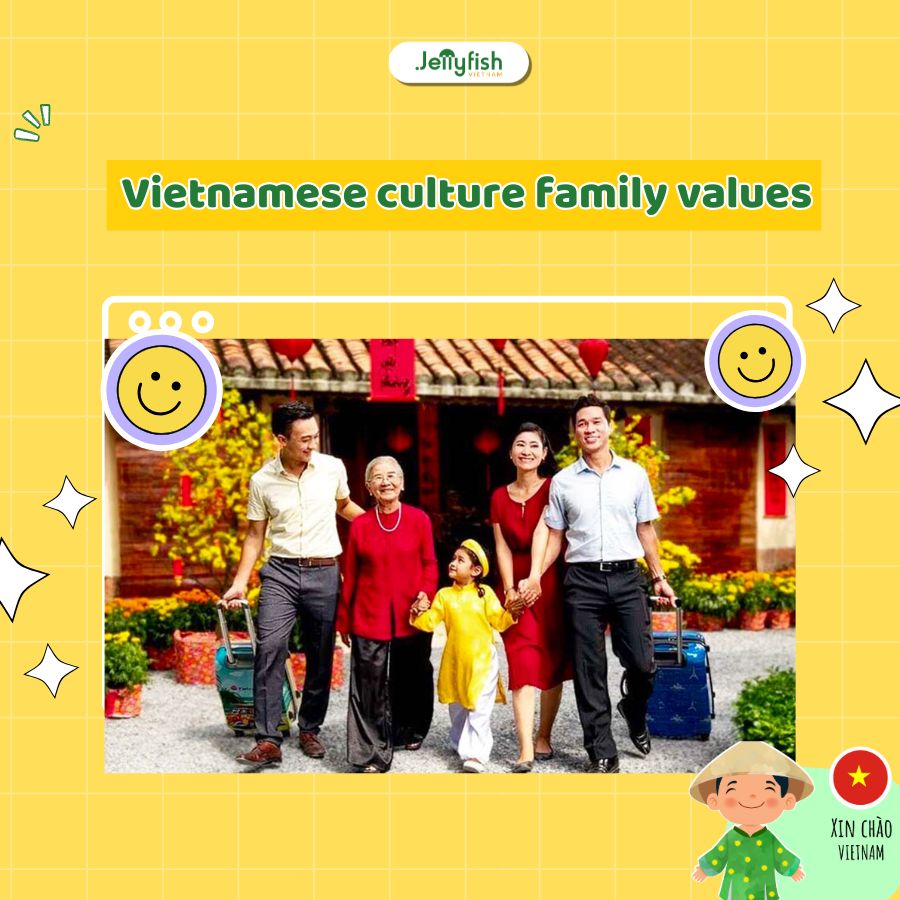In Vietnam, family isn’t just important, it’s everything. At the heart of daily life, social structure, and even national identity lie the deep-rooted values passed down through generations. In this article, Jellyfish explores the core of Vietnamese culture family values, offering insight into how respect, responsibility, and harmony shape the way Vietnamese people live, love, and grow together.
1. The central role of family in Vietnamese society
In Vietnamese culture, the family is considered the most basic and essential unit of society. It’s not only where one is born but also where life lessons, traditions, and values are passed on.
- Families often include multiple generations living under one roof grandparents, parents, and children
- Children are expected to care for their elders as they age
- Major decisions (education, marriage, jobs) are often made with family input
This tight-knit structure reflects the core of Vietnamese culture family values putting collective well-being before individual interests.
2. Respect for elders and ancestors
One of the most important aspects of Vietnamese culture family values is respect for elders. It is deeply ingrained in everyday life and social behavior.
- Children greet elders with polite language and gestures
- Meals are often served to the eldest family members first
- Elders’ opinions are highly valued in family decisions
In addition to living elders, ancestor worship is also a powerful tradition. Most Vietnamese homes have an altar to honor deceased family members, with offerings made on anniversaries and holidays. This reflects the belief that ancestors continue to protect and guide the family.
3. Roles and responsibilities within the family
Traditionally, Vietnamese families follow a patriarchal system, though this is gradually changing with modernization.
- Fathers are seen as the primary decision-makers and providers
- Mothers handle household duties and raise children
- Older siblings often help care for younger ones
- Children are taught to obey and show gratitude toward their parents
In modern society, however, women also increasingly contribute to financial responsibilities and decision-making, playing a more equal role alongside men in both family and social matters.

4. Education and sacrifice for future generations
Education is viewed not only as a personal achievement but as a family mission. Parents will go to great lengths, financially and emotionally to ensure their children succeed.
- Many parents work extra jobs or move to cities to support education
- Grandparents often help raise grandchildren to allow parents to focus on work
- Children are expected to study hard as a way to “repay” their parents
This mindset comes from the belief that a child’s success is a family’s success, and it’s one of the most defining features of Vietnamese culture family values.
5. Family in celebrations and daily life
From daily meals to national holidays, family plays a central role in all Vietnamese celebrations:
- Tết (Lunar New Year): The biggest family holiday, when people return to their hometowns to honor ancestors and reunite
- Weddings and funerals: Entire extended families gather to support and participate in rituals
- Daily life: It’s common for several generations to share meals and live in the same home
These shared moments create strong emotional bonds and reinforce the importance of togetherness, a pillar of Vietnamese culture family values.
Conclusion
At its heart, Vietnamese culture family values reflect a commitment to unity, respect, and generational connection. Whether it’s honoring ancestors, caring for aging parents, or sacrificing for a child’s education, these values are the threads that weave together the fabric of Vietnamese life.
In an ever-changing world, Vietnamese families continue to hold tightly to these traditions — finding new ways to honor the past while embracing the future.
Learn About Vietnamese Culture With Jellyfish
Understanding Vietnamese culture and family values is just one step toward connecting more deeply with Vietnam. At Jellyfish, we offer Vietnamese language and culture courses designed to help you:
- Communicate meaningfully with locals
- Learn cultural etiquette and customs
- Understand family structures, traditions, and beliefs
👉👉 Learning Vietnamese – Jellyfish Vietnam
✦ Hotline: 096 110 6466
✦ Head office: 1st Floor, Web3 Tower Building, Alley 4 Duy Tan Street, Cau Giay District, Hanoi
✦ Branch office: Sholega building, 275 Lach Tray, Ngo Quyen, Hai Phong
✦ Head office in Japan: 4F Westhill Building, Nishigotanda 2-24-4, Shinagawa, Tokyo, Japan


